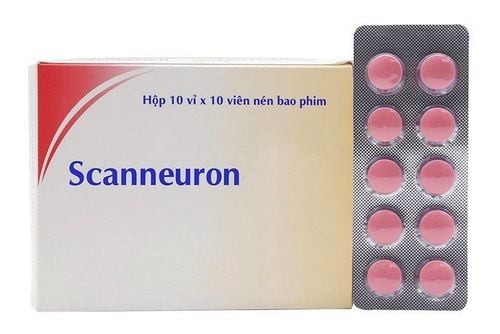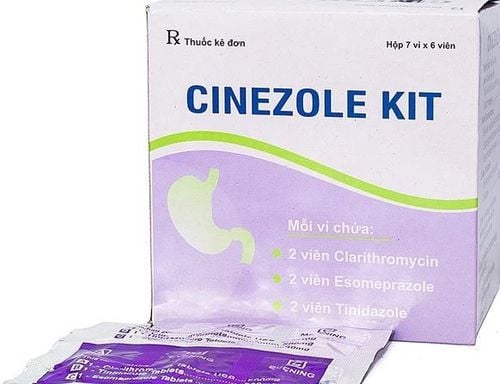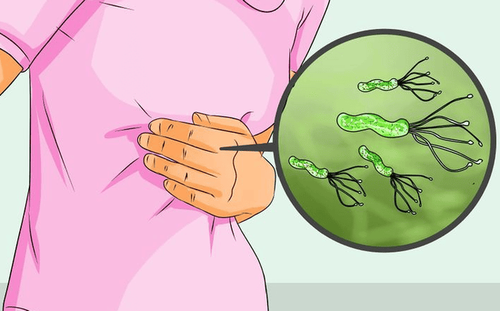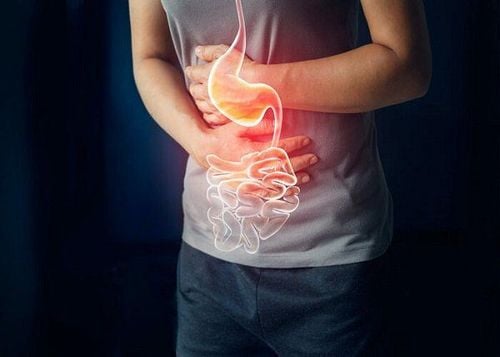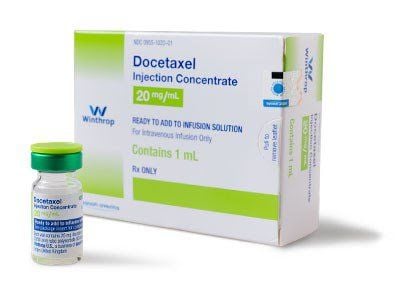This is an automatically translated article.
The article is professionally consulted by Master, Doctor Mai Vien Phuong - Gastroenterologist - Department of Medical Examination & Internal Medicine - Vinmec Central Park International General Hospital.Gastritis can happen suddenly (acute gastritis) or it can happen slowly over time (chronic gastritis). In some cases, gastritis can lead to ulcers and an increased risk of stomach cancer.
I. Outline
Autoimmune gastritis (VDDTM) is an atrophic gastritis of the gastric mucosa, mainly focusing on the body and stomach due to the appearance of antibodies against the parietal cells of the stomach and intrinsic factors, which can lead to destruction of the stomach. destroys the stomach lining, resulting in anemia and vitamin B12 deficiency, even leading to stomach cancer.
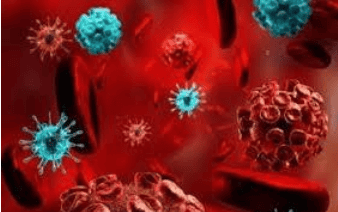
II. Pathogenesis
In 1973, Strickland introduced the concept of chronic atrophic gastritis type A and type B in which type A was defined as atrophic gastritis (normal antral mucosa) and the presence of antibodies. against gastric parietal cells. Type B is defined as atrophic gastritis occurring mainly in the antrum and in the absence of antibodies.
Over time, type A leads to vitamin B12 malabsorption and megaloblastic anemia while type B96.81 rarely results in vitamin B12 deficiency. Basically, type A atrophic gastritis is caused by an autoimmune mechanism, while type B96.81 is caused by H.pylori bacteria.
In autoimmune gastritis the most affected area is the gastric aneurysm and body and most patients have parietal cell antibodies or positive endogenous factor antibodies.
The pathogenesis is due to lymphocyte infiltration and specific destruction of parietal cells, the main cells of the body, leading to the reduction or disappearance of gastric glands as well as proliferation of cells. immature neck. These cells can differentiate into a type of cell such as the intestinal thermophilic cells that are able to release histamine, thereby increasing gastrin levels. It is the proliferation of this cell group that may predispose to tumor formation of intestinal thermophiles in autoimmune gastritis.
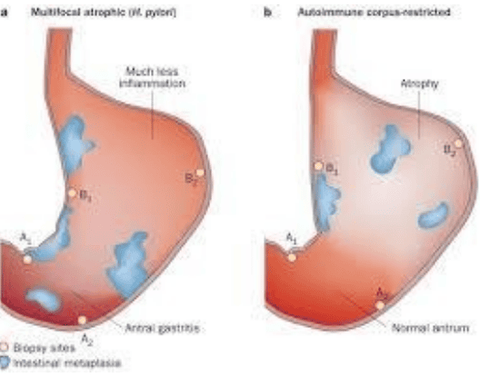
In DV, the normal acid secretion mechanism of the stomach is disrupted. Normally, gastric acid secretion is activated by the enzyme H+K+ATPase at the parietal cell surface. Regulators of acid secretion include neurotropic substances (acetylcholine from enteric neurons), parahormones (such as histamine from enterochromaffin-like cells (ECLs). ) and hormones (gastrin from G cells in the antrum). Somatostatin from gastric D cells is a major inhibitor of acid secretion through inhibition of ECL cells, G cells, and parietal cells.
In VTE, the most severely affected area is the gastric aneurysm and most patients have parietal cell antibodies or intrinsic factor positive.
The pathogenesis is characterized by lymphocyte infiltration and specific destruction of parietal cells, the main cells of the body, leading to the reduction or disappearance of gastric glands as well as proliferation of gastric glands. immature mucinous gonadal cells.
These cells can differentiate into a type of cell such as the pheochromocytoma in mice that have the ability to release histamine, thereby increasing gastrin levels. It is the proliferation of this cell group that may cause the risk of tumor formation of ECL cells in VDD.
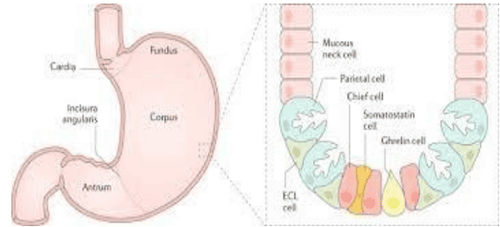
Until now, most of the understanding of the pathogenesis of VDD is due to research on experimental models. The results of the research process have shown that the main points of action of the main antibodies are the enzymes H+K21, K29+ATPase located on parietal cells. When parietal cells are destroyed, gastric acid and intrinsic factor are reduced. Intrinsic factors play an important role in the absorption of vitamin B12 in the terminal ileum so this process leads to chronic vitamin B12 deficiency. A decrease in gastric acid concentration will also lead to a downregulation of somatostatin and increased gastrin secretion from the G cells of the corpus cavernosum. Gastrin has an indirect effect on ECL cells, causing histamine secretion, which stimulates acid secretion.
Thus, over time, it was found that more and more parietal cells were destroyed, leading to decreased gastric acid production as demonstrated by increased gastric pH and proliferation of ECL cells.
Immunologically, the T cells in the gastric mucosa play a role in antigen recognition, the enzyme H+K+ATPase. When gastric biopsies were taken to isolate T-cell lines, most copper was CD4+. In addition, there are some cytokines, tumor necrosis factors. In patients with autoimmune gastritis, iron deficiency is also common. In a normal person, the amount of iron contained in the body is about 4 grams, 2/3 of the iron is in the hemoglobin of red blood cells, the rest is stored as ferritin in all cell types. Only a small amount of a few milligrams acts as activated iron in the systemic circulation by binding to transferrin.
Daily iron loss due to the death of skin cells, gastrointestinal mucosa, hair is about 1-2 milligrams, and it is compensated by the absorption of iron from food by the duodenal cells and upper jejunum. Iron deficiency occurs when the body's balance between absorption and loss of iron is disrupted.
Inflammation of parietal cell fibrosis will lead to decreased acid secretion, reduced absorption of Vitamin C, and these are factors that play an important role in iron absorption. Anemia in autoimmune gastritis has long been described; in these patients, iron supplementation was found to be necessary in treatment.
Vitamin B12 deficiency in chronic gastritis can also be caused by decreased intrinsic factor and decreased gastric acid secretion.
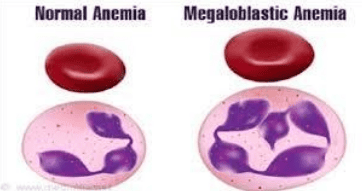
In autoimmune gastritis the normal acid secretion mechanism of the stomach is disrupted. Normally, gastric acid secretion is activated by the enzyme H+K+ATPase at the parietal cell surface. The main point of action of the antibody of the antibody is the enzyme H+K+ATPase on the surface of parietal cells. When parietal cells are destroyed, the acid in the gastric juice and internal factors is reduced.
Intrinsic factor plays an important role in the absorption of vitamin B12 in the terminal ileum, so this process leads to chronic vitamin B12 deficiency. A decrease in gastric acid concentration will also lead to a downregulation of somatostatin and increased gastrin secretion from G cells in the antrum. Gastrin has an indirect effect on the thermophilic cells in the intestine, causing histamine secretion to stimulate acid secretion.
Therefore, over time, it is found that more and more parietal cells are destroyed, leading to a decrease in gastric acid production as shown by an increased pH in the stomach and an increase in the proliferation of thermophilic cells in the intestine.
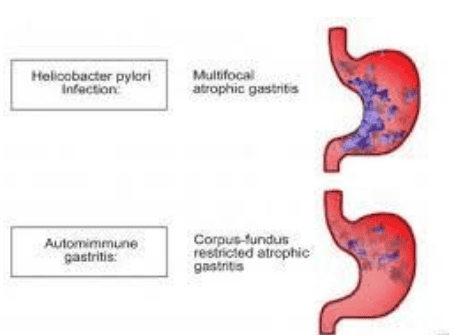
Vinmec International General Hospital is one of the hospitals that not only ensures professional quality with a team of doctors, modern equipment and technology. The hospital provides comprehensive, professional medical examination, consultation and treatment services, with a civilized, polite, safe and sterile medical examination and treatment space. Customers when choosing to perform tests here can be completely assured of the accuracy of test results.
Please dial HOTLINE for more information or register for an appointment HERE. Download MyVinmec app to make appointments faster and to manage your bookings easily.
References
1.Carmel R(2996) Prevalence of undiagnosed pernicious anemia in the elderty Arch Intern Med, 156 1097-200. 2. Andres E, Serraj K (2012), Optimal management of pernicious anemia. JBlood Med, 3:97-103. 3. S Strickland RG, Mackay IR (1973), A reappraisal significance of the nature and of chronic atrophic gastritis. Am J Dig Dis, 18:426-40. 4. Park JY, Lam-Himlin D, Vemulapalli R (2013). Review of autoimmune metaplastic atrophic gastritis. Gastrointest Endosc, 77(2):284-92. 5. Kulnigg-Dabsch S.(2016), “Autoimmune gastritis”, Wien Med Wochenschr 166(13-14):424-430





